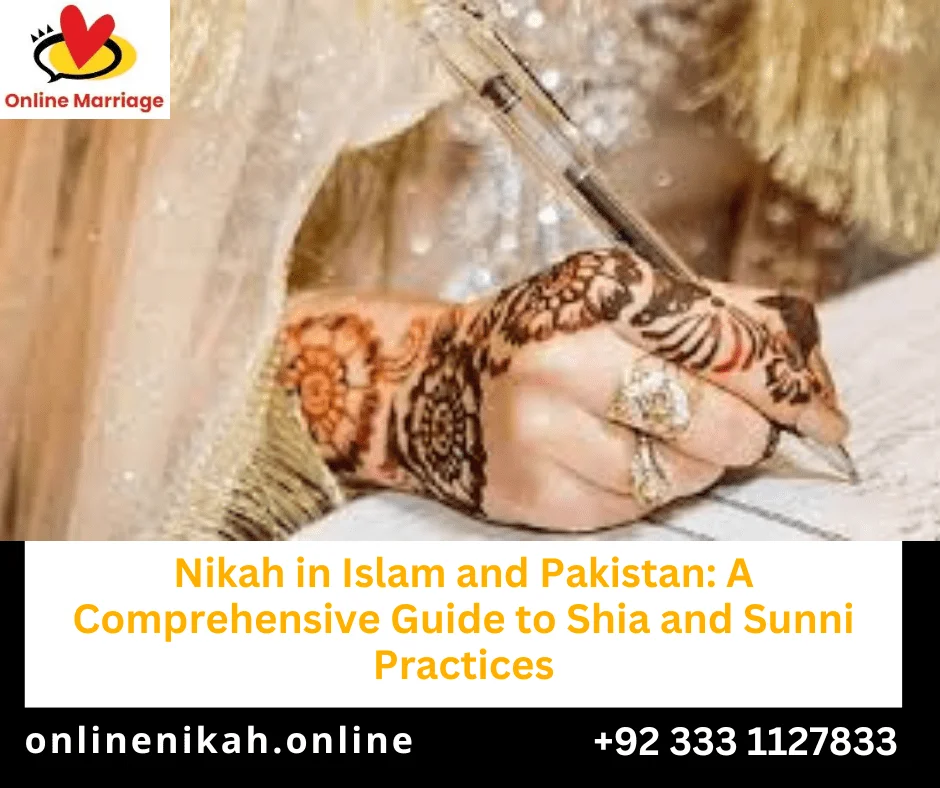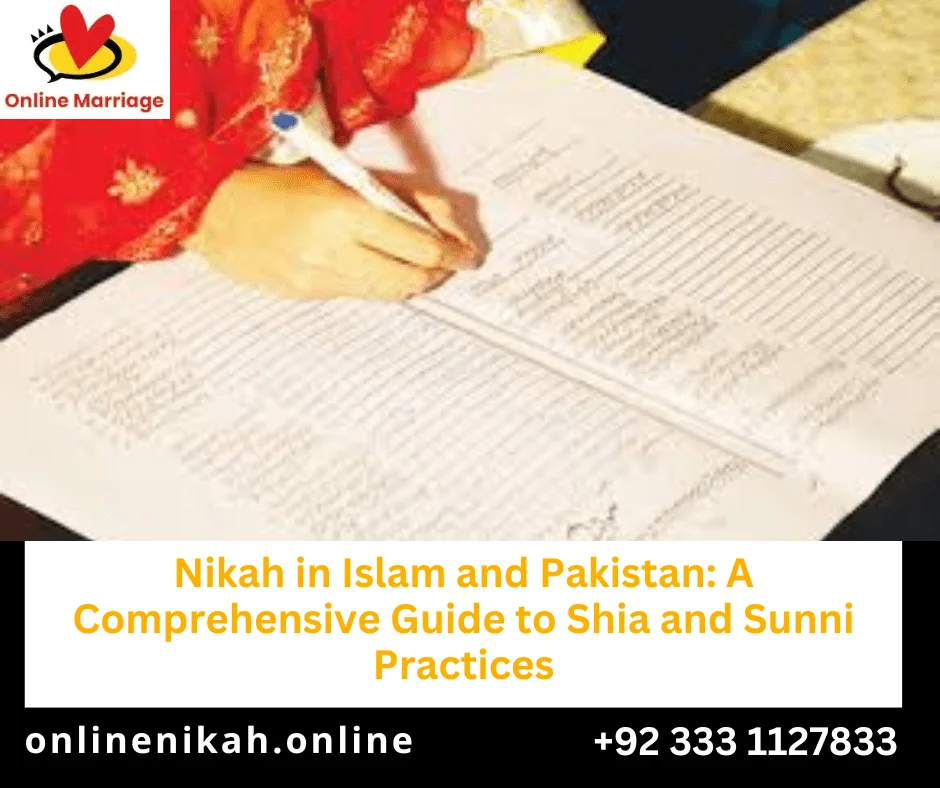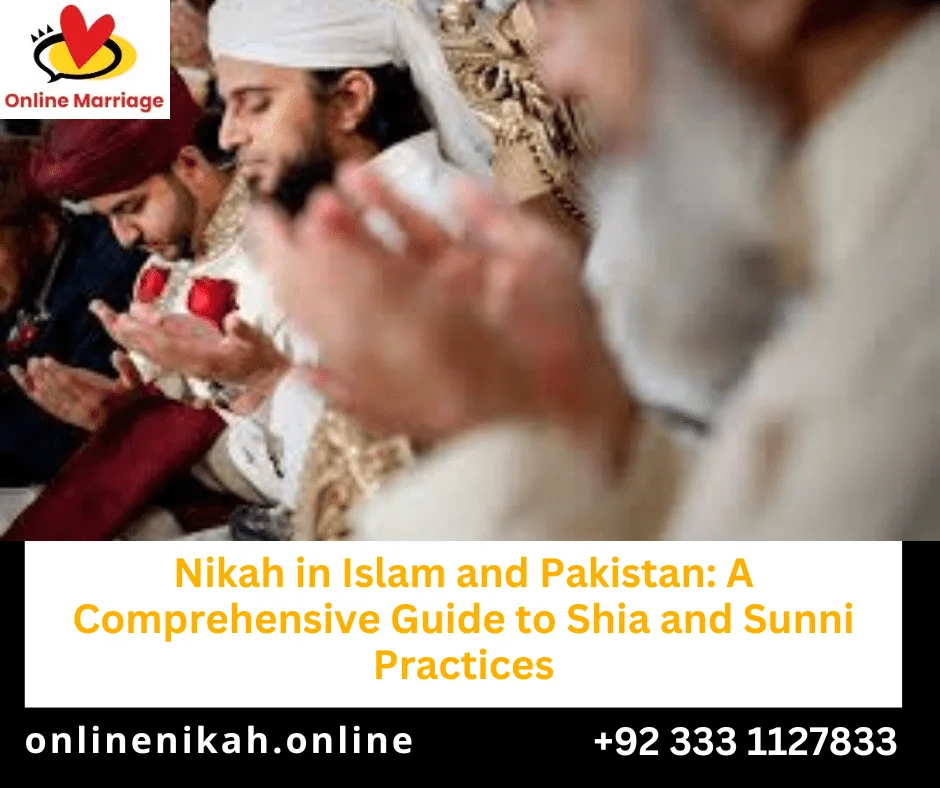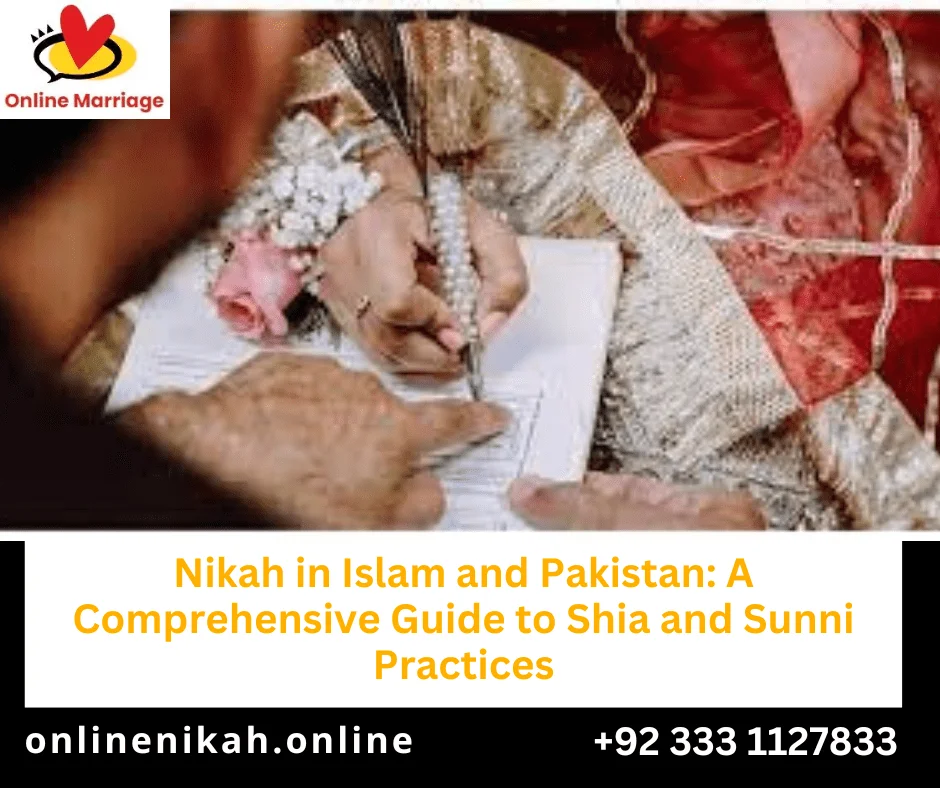Menu
Nikah, the Islamic marriage contract, represents a profound and sacred union that holds significant social and spiritual dimensions within the faith. As delineated in the Quran and Hadith, nikah is not merely a legal contract but a covenant celebrated and revered within the Muslim community. The significance of nikah in Islam extends beyond the individuals involved, as it symbolizes a foundational pillar that contributes to societal harmony and spiritual fulfillment.
The principles governing nikah reflect core Islamic values, emphasizing love, compassion, and mutual responsibilities between partners. The marital relationship is intended to be one of mutual respect and support, where each partner complements the other, fostering an environment of tranquility and understanding. According to Islamic teachings, both the husband and wife are encouraged to fulfill their roles with fairness, kindness, and a shared commitment to the household’s well-being.
Embedded within the concept of nikah is the theological principle that marriage is half of one’s faith. This underscores its importance not only as a social institution but as a means of attaining spiritual growth and divine pleasure. The Quran highlights marriage as a sign of God’s mercy, where He “created for you from yourselves mates that you may find tranquility in them, and He placed between you affection and mercy” (Quran 30:21). This verse encapsulates the serene and compassionate nature that Islamic marriage aims to achieve.
The ceremony of nikah is both a formalized agreement and a celebratory declaration witnessed by the Muslim community, encompassing various customs and rituals particular to different sects and cultures. Whether conducted in a traditional setting or as an online nikah, the core values and principles remain constant. The contractual aspect involved often includes the mahr (dowry) given to the bride, symbolizing the groom’s commitment and responsibilities.
In essence, nikah serves as an institution promoting personal and communal stability, encouraging a virtuous lifestyle aligned with Islamic teachings. It lays the foundation for a family unit grounded in faith, moral integrity, and compassion, which are essential for ensuring the well-being and cohesion of the broader society.


The institution of nikah in Islam, rooted in the Qur’an and Hadith, stands as one of the foundational aspects of Muslim life. Historically, the concept of nikah evolved from pre-Islamic traditions into a formalized contract under Islamic law, intertwining religious, social, and legal facets. In early Islamic history, the Prophet Muhammad’s teachings significantly shaped the parameters of marital union, emphasizing mutual consent, mahr (dower), and the husband’s responsibility towards his wife. These elements established nikah as not just a personal agreement but a sacred covenant witnessed by Allah.
Throughout centuries, the practice of nikah has undergone notable transformations, adapting to varying cultural and regional contexts. In the early Islamic period, nikah arrangements were primarily facilitated by family elders, reflecting the communal approach to marriage. As Islamic empires expanded from the Arabian Peninsula to regions such as Persia, the Indian subcontinent, and North Africa, indigenous customs began to influence how nikah ceremonies were conducted. For instance, Persian cultural influences introduced elaborate wedding celebrations, integrating elements that reflected pre-Islamic traditions. Similarly, in South Asia, local customs such as the giving of dowries became intertwined with Islamic marital practices.
The evolution of nikah further saw the development of distinct jurisprudential schools within Sunni and Shia Islam, each presenting unique interpretations of marriage laws. Sunni schools of thought, such as Hanafi, Maliki, Shafi’i, and Hanbali, have nuanced views on matters like guardianship and the conditions of the marriage contract. In Shia Islam, particularly within the Twelver sect, there is a notable emphasis on the temporary marriage (mut’ah) in addition to permanent nikah, underscoring the diversity within Islamic marital practices.
More recently, technological advancements have sparked discussions around online nikah, raising questions about its validity and compliance with Islamic principles. This modern adaptation highlights the dynamic nature of nikah, reflecting the continuous interaction between tradition and contemporary realities. As online nikah becomes more prevalent, scholars are increasingly engaging in Islamic jurisprudential debates to ensure these new forms align with the core values and principles of Muslim nikah.
The legal framework governing nikah in Pakistan is anchored in the intersection of Islamic principles and the country’s family law. The Family Laws Ordinance of 1961, amended multiple times, serves as the bedrock for the regulation of marriages, including nikah, ensuring they conform to both religious and legal standards. For a nikah to be considered valid in Pakistan, it must adhere to several stipulations which encompass both stipulations of Islamic jurisprudence and civil requirements.
In Pakistan, the marriage contract, or nikahnama, is a pivotal document. This contract delineates the rights and duties of both parties and must be meticulously filled out. The nikahnama has four requisite copies: one for the bride, one for the groom, one for the local Union Council, and one for the registrar. The primary aim of this process is to institute a formal legal recognition of the marriage, which is crucial for the protection of both parties under the law.
The registration of nikah is conducted by a licensed Nikkah Registrar, appointed by the local Union Council. This registrar is responsible for ensuring that all legal prerequisites are met, including the mutual consent of the bride and groom, the presence of two adult male witnesses, and the payment of dower (mehr). The registrar also plays a critical role in the formal documentation and submission of the nikah contract to the Union Council, safeguarding the marriage under legal scrutiny.


Religious authorities are integral to the process of a Muslim nikah. While the legal formalities underline the procedural aspect, the sanctity of marriage in Islam is upheld by religious guidelines. In both Sunni and Shia traditions, a religious scholar (or imam) often officiates the marriage ceremony, ensuring that it aligns with Islamic principles. This dual observance of civil and religious requirements ensures the nikah is both legally valid and spiritually significant.
The advent of technology has introduced the concept of online nikah. This modern adaptation, while growing in popularity, is still subjected to scrutiny under Pakistani law. Government authorities and religious scholars are in the continuous process of establishing clear guidelines to validate online nikah ceremonies, ensuring they meet the same stringent requirements as traditional ones.
Overall, the legal framework governing nikah in Pakistan provides a comprehensive system that ensures both compliance with Islamic jurisprudence and legal statutes. While challenges remain, especially with the integration of online matrimonies, the existing protocols strive to maintain the sanctity and legality of the marriage institution in Pakistan.
Nikah, or marriage in Islam, holds profound spiritual and ethical importance, as it is considered a sacred covenant between two individuals. Beyond the legal and social dimensions, Islamic teachings emphasize the substantial spiritual rewards that accompany this union. Engaging in nikah is not merely a cultural or traditional practice; it is an act of worship that aligns with the divine commands of Allah. The Prophet Muhammad (PBUH) has articulated the elevated spiritual benefits associated with nikah, underscoring its role in fostering piety and moral integrity. Within the sanctity of marriage, couples are encouraged to cultivate spiritual growth, offering each individual an opportunity to fortify their faith.
Nikah establishes a framework grounded in ethical principles that guide marital relationships. Central to these principles is the notion of loyalty. Islam places a high value on trust and fidelity between spouses, recognizing them as pillars that uphold the marital institution. This loyalty is not limited to physical faithfulness but extends to emotional and spiritual devotion, ensuring that both partners remain committed to their shared journey of life.
Compassion is another critical ethical value promoted through nikah. This principle fosters a nurturing and loving environment, which is essential for the well-being of both spouses. The Qur’an and Hadith emphasize the importance of mutual compassion, advocating for patience, understanding, and kindness in marital relations. Such compassion not only enhances personal connections but also contributes significantly to the overall harmony and stability of the household.
Moreover, mutual respect between spouses is paramount in a Muslim nikah. Respect in this context encompasses acknowledging each other’s rights and responsibilities, valuing each other’s opinions, and upholding dignity in all interactions. This mutual respect is the bedrock upon which a harmonious and effective partnership is built, enabling couples to navigate challenges and celebrate successes together.
In essence, nikah in Islam is not solely a ritualistic act but a comprehensive system designed to bring both spiritual fulfillment and ethical refinement. Through loyalty, compassion, and mutual respect, it fosters a conducive environment for personal growth and societal harmony, making the institution of marriage a cornerstone of a balanced Islamic life.
Shia nikah ceremonies are characterized by distinctive traditions that reflect theological nuances unique to this branch of Islam. At the heart of a Shia nikah is the recitation of specific prayers and verses from the Quran, which are integral to the solemnization of the marriage. These prayers not only seek divine blessings for the union but also reinforce the spiritual and communal dimensions of the matrimonial contract.
One of the key elements of Shia nikah is the role of witnesses, known as “Adil Shahidain.” In Shia Islam, the presence of two male witnesses, or one male and two female witnesses, who are upright and just, is a fundamental requirement. These witnesses oversee the marriage contract (Nikah Nama) and ensure its compliance with Islamic principles. The witness’s role is pivotal as it adds an additional layer of verification and social accountability to the nikah, which is widely observed in Muslim nikah traditions.
Another distinctive feature of Shia nikah is the contractual stipulations, or “Mahr.” Mahr is a mandatory gift from the groom to the bride, which must be agreed upon before the marriage contract is signed. In Shia traditions, the amount and nature of the Mahr are often explicitly detailed and can include monetary gifts, property, or other valuable assets. This contractual element emphasizes the importance of financial security and respect within the marriage.


During a Shia nikah, specific prayers and Quranic verses are recited, invoking the blessings of Allah and seeking guidance for a harmonious marital life. These recitations typically include verses from Surah Al-Fatiha, Surah Al-Ikhlas, and other pertinent sections that emphasize the sanctity and responsibilities of marriage.
The presence of witnesses in a Shia nikah acts as a testament to the integrity of the marriage process. Witnesses, who must be just and trustworthy individuals, play an essential role in validating the union. Their witness ensures transparency and adherence to Islamic laws, a custom upheld in both traditional and online nikah contexts.
The Mahr, or dowry, is an indispensable part of the Shia marriage contract. This token of commitment from the groom to the bride underscores the significance of the marital agreement and ensures the bride’s financial rights are protected. Stipulations related to the Mahr are meticulously discussed and documented, preserving the contractual integrity unique to Shia nikah practices.
These elements collectively form the essence of a Shia nikah, highlighting its unique attributes within the broader spectrum of Islamic matrimonial traditions.
Sunni nikah, one of the core facets of Islamic matrimonial traditions, embodies a series of distinctive rituals and customs. Understanding these nuances aids in appreciating the profound significance that nikah holds in Islam. A primary component of the Sunni nikah is the wajib khutba, which is a mandatory sermon delivered by the officiating cleric. This sermon often includes verses from the Quran, emphasizing the sanctity of marriage and the duties of the spouses within an Islamic framework. It serves as a spiritual guide, reminding the couple and attendees of the religious significance of the union.
Another pivotal element in a Sunni nikah is the presence of witnesses. According to Sunni jurisprudence, at least two Muslim male witnesses, or one male and two female witnesses, must be present to validate the nikah contract. These witnesses serve as guarantors of the marriage’s legitimacy, ensuring that the process adheres to Islamic rules and transparency. Their presence is essential, as their testimonies uphold the integrity of the nikah.
The contractual aspects of Sunni nikah are also distinctive. The marriage contract, or nikahnama, includes stipulations agreed upon by both parties. It encompasses the mahr – a mandatory gift from the groom to the bride, signifying his commitment and respect. The terms of the contract can be negotiated, reflecting the mutual consent and satisfaction of both parties, which is a cornerstone of Muslim nikah practices.
Additionally, the rituals associated with Sunni nikah vary, but often include public announcements and celebrations, reinforcing the community’s role in the union’s acknowledgment. The blend of religious, legal, and social dimensions within these traditions showcases the comprehensive nature of Sunni nikah, making it not just a personal commitment but a communal affirmation as well.


The concept of nikah in Islam, a sacred contract between a man and a woman, is both deeply rooted in tradition and significantly evolving in contemporary times. Recent global challenges, notably the COVID-19 pandemic, have prompted a shift toward online nikah. This adaptation is driven by the necessity to maintain social distancing protocols while ensuring that the essential aspects of this Islamic practice are upheld.
Online nikah has rapidly gained popularity as a viable alternative to traditional ceremonies. Particularly during periods of social restrictions, virtual platforms have enabled couples to proceed with their nikah without physical gatherings, thus adhering to public health guidelines. This innovation, while convenient, raises questions about its legal recognition and the procedural integrity of the marriage contract in the eyes of Islamic law.
From a legal perspective, various countries, including Pakistan, have begun to acknowledge and provide frameworks for the conduct of online nikah. The procedural integrity of an online nikah is safeguarded through rigorous verification processes, ensuring the presence and consent of both parties, along with obligatory witnesses. Consequently, such measures are fundamental to maintaining the sanctity and legitimacy of the marital agreement.
The halal status of online nikah is a topic of interest within Islamic jurisprudence. Scholars across different schools of thought, both Shia and Sunni, have engaged in extensive discussions regarding its validity. Predominantly, the consensus is that if all essential elements of a nikah are observed—mutual consent, offering and acceptance (Ijab-O-Qubul), presence of witnesses, and the declaration of the mahr (dower)—then the mode of communication does not invalidate the contract. Thus, online nikah can be deemed permissible, provided these conditions are meticulously met.
In summation, online nikah represents a significant adaptation to modern challenges while adhering to the core principles of Islam. This evolution showcases the flexibility and resilience of Islamic practices in the face of unprecedented global circumstances. The acceptance and recognition of online nikah continue to grow as it aligns with both legal requirements and religious observances, paving the way for its increasing adoption in the future.
In conclusion, nikah remains a cornerstone of social structure and personal happiness within the Islamic community. Whether through traditional ceremonies or modern alternatives such as online nikah, the fundamental principles are deeply rooted in Quranic teachings and the Hadith. This institution provides a framework not only for spiritual growth but also for societal stability, acting as a binding force that fosters mutual respect and shared responsibilities among spouses.
As we navigate through the complexities of modern life, it is essential to recognize the evolving nature of nikah practices. The advent of online nikah, especially, has revolutionized the way Muslim couples can fulfill their religious obligations in the face of geographical barriers and logistical challenges. The debate on “Is online nikah valid?” has largely been settled with numerous Islamic authorities endorsing its legitimacy, provided that all other conditions of the marriage contract are met.
Looking ahead, the future of nikah will likely see a blend of tradition and technology. While maintaining the sacred and communal aspects of marriage, additions such as digital platforms for matchmaking and marital education resources can offer invaluable support to couples. These tools can help navigate the pre-marriage stage, ensuring that both partners are well-prepared for the journey ahead.
Moreover, potential reforms in the legislation surrounding nikah could address modern issues such as women’s rights, polygamy, and divorce procedures, ensuring that the institution evolves while staying true to Islamic principles. Continuous dialogue within the Muslim community, inclusive of both Shia and Sunni perspectives, will be crucial in meeting these challenges.
Therefore, the importance of nikah in Islam cannot be overstated. As society changes, so too must our understanding and implementation of this vital institution, ensuring it remains a source of personal fulfillment and social harmony for generations to come.
If you want to know anything about our services, you can contact us through Phone, WhatsApp.